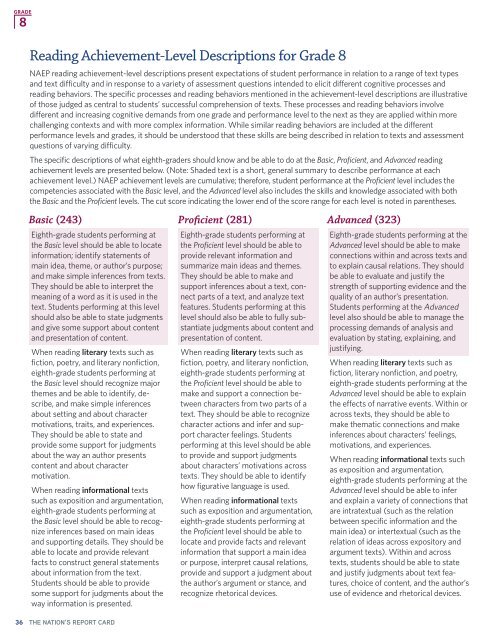Reading 2009 - African American Communication and Collaboration ...
Reading 2009 - African American Communication and Collaboration ...
Reading 2009 - African American Communication and Collaboration ...
Create successful ePaper yourself
Turn your PDF publications into a flip-book with our unique Google optimized e-Paper software.
GRADE<br />
8<br />
<strong>Reading</strong> Achievement-Level Descriptions for Grade 8<br />
NAEP reading achievement-level descriptions present expectations of student performance in relation to a range of text types<br />
<strong>and</strong> text difficulty <strong>and</strong> in response to a variety of assessment questions intended to elicit different cognitive processes <strong>and</strong><br />
reading behaviors. The specific processes <strong>and</strong> reading behaviors mentioned in the achievement-level descriptions are illustrative<br />
of those judged as central to students’ successful comprehension of texts. These processes <strong>and</strong> reading behaviors involve<br />
different <strong>and</strong> increasing cognitive dem<strong>and</strong>s from one grade <strong>and</strong> performance level to the next as they are applied within more<br />
challenging contexts <strong>and</strong> with more complex information. While similar reading behaviors are included at the different<br />
performance levels <strong>and</strong> grades, it should be understood that these skills are being described in relation to texts <strong>and</strong> assessment<br />
questions of varying difficulty.<br />
The specific descriptions of what eighth-graders should know <strong>and</strong> be able to do at the Basic, Proficient, <strong>and</strong> Advanced reading<br />
achievement levels are presented below. (Note: Shaded text is a short, general summary to describe performance at each<br />
achievement level.) NAEP achievement levels are cumulative; therefore, student performance at the Proficient level includes the<br />
competencies associated with the Basic level, <strong>and</strong> the Advanced level also includes the skills <strong>and</strong> knowledge associated with both<br />
the Basic <strong>and</strong> the Proficient levels. The cut score indicating the lower end of the score range for each level is noted in parentheses.<br />
Basic (243)<br />
Eighth-grade students performing at<br />
the Basic level should be able to locate<br />
information; identify statements of<br />
main idea, theme, or author’s purpose;<br />
<strong>and</strong> make simple inferences from texts.<br />
They should be able to interpret the<br />
meaning of a word as it is used in the<br />
text. Students performing at this level<br />
should also be able to state judgments<br />
<strong>and</strong> give some support about content<br />
<strong>and</strong> presentation of content.<br />
When reading literary texts such as<br />
fiction, poetry, <strong>and</strong> literary nonfiction,<br />
eighth-grade students performing at<br />
the Basic level should recognize major<br />
themes <strong>and</strong> be able to identify, describe,<br />
<strong>and</strong> make simple inferences<br />
about setting <strong>and</strong> about character<br />
motivations, traits, <strong>and</strong> experiences.<br />
They should be able to state <strong>and</strong><br />
provide some support for judgments<br />
about the way an author presents<br />
content <strong>and</strong> about character<br />
motivation.<br />
When reading informational texts<br />
such as exposition <strong>and</strong> argumentation,<br />
eighth-grade students performing at<br />
the Basic level should be able to recognize<br />
inferences based on main ideas<br />
<strong>and</strong> supporting details. They should be<br />
able to locate <strong>and</strong> provide relevant<br />
facts to construct general statements<br />
about information from the text.<br />
Students should be able to provide<br />
some support for judgments about the<br />
way information is presented.<br />
36 THE NATION’S REPORT CARD<br />
Proficient (281)<br />
Eighth-grade students performing at<br />
the Proficient level should be able to<br />
provide relevant information <strong>and</strong><br />
summarize main ideas <strong>and</strong> themes.<br />
They should be able to make <strong>and</strong><br />
support inferences about a text, connect<br />
parts of a text, <strong>and</strong> analyze text<br />
features. Students performing at this<br />
level should also be able to fully substantiate<br />
judgments about content <strong>and</strong><br />
presentation of content.<br />
When reading literary texts such as<br />
fiction, poetry, <strong>and</strong> literary nonfiction,<br />
eighth-grade students performing at<br />
the Proficient level should be able to<br />
make <strong>and</strong> support a connection between<br />
characters from two parts of a<br />
text. They should be able to recognize<br />
character actions <strong>and</strong> infer <strong>and</strong> support<br />
character feelings. Students<br />
performing at this level should be able<br />
to provide <strong>and</strong> support judgments<br />
about characters’ motivations across<br />
texts. They should be able to identify<br />
how figurative language is used.<br />
When reading informational texts<br />
such as exposition <strong>and</strong> argumentation,<br />
eighth-grade students performing at<br />
the Proficient level should be able to<br />
locate <strong>and</strong> provide facts <strong>and</strong> relevant<br />
information that support a main idea<br />
or purpose, interpret causal relations,<br />
provide <strong>and</strong> support a judgment about<br />
the author’s argument or stance, <strong>and</strong><br />
recognize rhetorical devices.<br />
Advanced (323)<br />
Eighth-grade students performing at the<br />
Advanced level should be able to make<br />
connections within <strong>and</strong> across texts <strong>and</strong><br />
to explain causal relations. They should<br />
be able to evaluate <strong>and</strong> justify the<br />
strength of supporting evidence <strong>and</strong> the<br />
quality of an author’s presentation.<br />
Students performing at the Advanced<br />
level also should be able to manage the<br />
processing dem<strong>and</strong>s of analysis <strong>and</strong><br />
evaluation by stating, explaining, <strong>and</strong><br />
justifying.<br />
When reading literary texts such as<br />
fiction, literary nonfiction, <strong>and</strong> poetry,<br />
eighth-grade students performing at the<br />
Advanced level should be able to explain<br />
the effects of narrative events. Within or<br />
across texts, they should be able to<br />
make thematic connections <strong>and</strong> make<br />
inferences about characters’ feelings,<br />
motivations, <strong>and</strong> experiences.<br />
When reading informational texts such<br />
as exposition <strong>and</strong> argumentation,<br />
eighth-grade students performing at the<br />
Advanced level should be able to infer<br />
<strong>and</strong> explain a variety of connections that<br />
are intratextual (such as the relation<br />
between specific information <strong>and</strong> the<br />
main idea) or intertextual (such as the<br />
relation of ideas across expository <strong>and</strong><br />
argument texts). Within <strong>and</strong> across<br />
texts, students should be able to state<br />
<strong>and</strong> justify judgments about text features,<br />
choice of content, <strong>and</strong> the author’s<br />
use of evidence <strong>and</strong> rhetorical devices.


